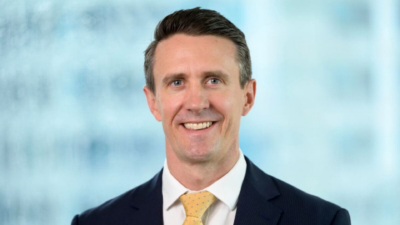TIAA-CREF brings full range of asset management
(Pictured: Andrew Kleinig)
TIAA-CREF, a US firm with which many Australian industry funds have had discussions over the years, has opened an Australian office and last week held two roundtables – one on ESG issues and the other on investing in ‘real’ assets. But it’s TIAA-CREF’s expertise in retirement services that may most interest Australian funds.
TIAA-CREF is a very unusual firm. It was started in 1918 by philanthropist Andrew Carnegie to provide inexpensive life insurance for US academics and teachers. That’s the TIAA part, standing for Teachers Insurance and Annuities Association. It took over from the free pensions being provided by the Carnegie Foundation for the Advancement of Teaching. In the 1950s it formed CREF to allow academics to invest in the sharemarket through the US’s first variable annuity. Subsequently it moved into asset management for third parties and currently has about US$850 billion across a range of asset classes in its asset management division. The legal entity is owned by the board of overseers and the assets owned by the members. One of its more famous members was Albert Einstein.
Today, TIAA-CREF offers a broad array of pensions and funds management services, including ESG investing, as well as operating a type-of multi-affiliate model through associated partnerships in unlisted assets.
Andrew Kleinig, an Australian fund manager who was most recently with Paul Chadwick’s Nanuk Asset Management, joined TIAA-CREF last September. One of the firm’s affiliates, TIAA Henderson Real Estate, set up shop in Australia last year too.
Kleinig will be concentrating on marketing TIAA-CREF’s real asset capabilities, ESG strategies and also co-investments for big super funds. Other affiliates of interest locally are an agricultural investment strategy through Westchester Group Investment Management and timber investments through renewable resources manager Greenwood Resources. TIAA-CREF also recently acquired a mid-market private credit firm, Churchill Asset Management, and last year paid US$6.5 billion for the big US retail manager Nuveen Investments.
Retirement products have been top of mind for many super fund trustees for several years but, for various reasons including taxation, their products have had a low take-up with members. Some industry participants believe the Government may have to legislate for retirees to take at least part of their assets as a pension.
Visiting Australia last week, John Panagakis, head of asset management business development, said that a lot of super fund executives and trustees visited TIAA-CREF and usually wanted to talk about member services and retirement choices.
“A typical criticism of retirement income providers is their high expenses. We’re a not-for-profit and have a low-expenses focus,” he said. “Another criticism is that they are not flexible enough. The key is to craft a personalized plan which is dynamic. That’s what we do.”
He said there were delegations coming over from TIAA-CREF over the next two-three months to talk with super funds about a broad range of issues.
Kleinig said that TIAA-CREF wanted to talk with any investors with a long-term focus.










